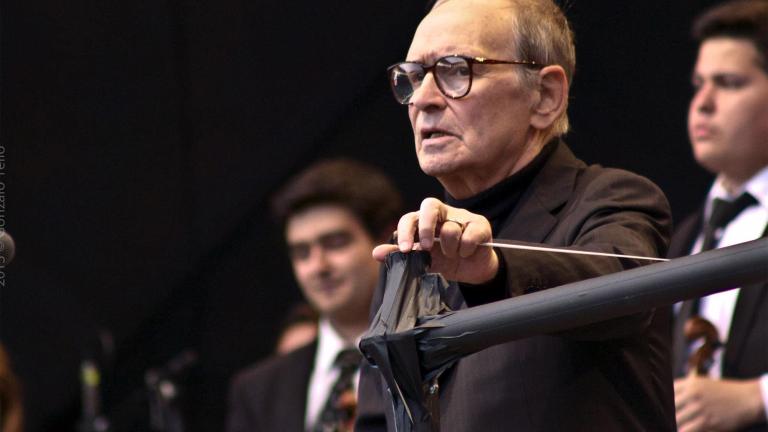Iconic Film and Classical Composer Ennio Morricone Dies at 91
From giallo horror through spaghetti Westerns to orchestral and jazz experiments, Ennio Morricone was "the Maestro."

Versatile film, avant-garde classical, jazz and pop composer Ennio Morricone died in a Rome hospital after falling and breaking his leg, his lawyer Giorgio Assumma announced, according to Variety. He was 91.
Known as “the Maestro,” Morricone is best known as the composer of the scores and themes of The Good, the Bad and the Ugly, Once Upon a Time in the West, and his Academy Award winning soundtrack for Quentin Tarantino’s The Hateful Eight. He also toured frequently, and expanded his sonic visions to reflect contemporary sounds. Besides his collaborations on the spaghetti Western films of Sergio Leone, Morricone composed for Bernardo Bertolucci, Dario Argento, Don Siegel, Brian De Palma, and John Carpenter. He composed for such diverse artists as Andrea Bocelli, Sting, k.d. lang, and Pet Shop Boys. Morricone never became fluent in English. When he won his 2007 honorary Oscar, his speech was translated by Clint Eastwood.
Morricone was born in Rome in 1928. His father was a trumpet player. Ennio composed his first piece at age six. He entered the esteemed conservatory Accademia Nazionale di Santa Cecilia at 12 and finished a four-year harmony program in six months. Morricone studied trumpet, composition, and choral music under composer Goffredo Petrassi. His career as an arranger began in 1950, with the piece “Mamma Bianca.”
Morricone moved into radio composition in 1953 after being asked by Gorni Kramer and Lelio Luttazzi to write medleys in an American style for a series of nighttime shows. Between 1954 and 1959 he composed pieces like “Musica per archi e pianoforte,” “Invenzione,” “Canone e Ricercare per piano,”
“Dodici Variazione per oboe, violoncello e piano,” Concerto per orchestra” and “Tre Studi per flauto, clarinetto e fagotto.” He preferred writing for the concert hall, but arranged and conducted for pop singers in the late 1950s. In 1959, he composed music for the stage show Il Lieto Fine by Luciano Salce.
Morricone played in a jazz band and wrote orchestral pieces before working for RCA as a studio arranger and composer. He arranged music for Mario Lanza, Renato Rascel, Rita Pavone, and Domenico Modugno. He worked with American jazz singer Helen Merrill, as well as Paul Anka. Morricone’s pop song “Se Telefonando” was one of Italy’s big hits of 1966.
In 1964, Morricone joined a collective called Gruppo di Improvvisazione Nuova Consonanza which was strongly influenced by the avant-garde experimentation of John Cage. Il Gruppo released seven albums, and played on the soundtracks to the films A Quiet Place in the Country (1969) and Cold Eyes of Fear (1971).
Morricone was a ghost writer for films credited to well-known composers as early as 1954. His first movie score was for director Luciano Salce’s 1961 film Il Federale. Unlike other film composers, he both wrote and arranged the orchestrations. Morricone composed film scores for several light comedies before he was hired by Leone to score for A Fistful of Dollars in 1964. His scores contained memorable hooks along with non-traditional instrumentation, such as whistles, gunfire, whip cracks, church bells, and a wide mixture of modern sounds. This is exemplified by the main theme to The Good, the Bad and the Ugly (1966).
The Maestro composed over 400 scores for cinema and television. He wrote for such directors as Don Siegel, Mike Nichols, Barry Levinson, John Carpenter, Sergio Corbucci, Duccio Tessari, Mauro Bolognini, Giuliano Montaldo, Roland Joffé, and Roman Polanski. His works grace over 70 award-winning films, including Gillo Pontecorvo’s The Battle of Algiers, Dario Argento’s Animal Trilogy, Bernardo Bertolucci’s 1900, Exorcist II, Days of Heaven, The Thing, The Mission, Brian De Palma’s The Untouchables, Mission to Mars, Disclosure, Danger: Diabolik, Navajo Joe, In the Line of Fire, Adrian Lyne’s Lolita, Oliver Stone’s U Turn and all Giuseppe Tornatore’s films since Cinema Paradiso. Morricone wrote a complete score for What Dreams May Come (1998), but director Vincent Ward found the music too emotional and used a score by Michael Kamen.
Morricone scored Édouard Molinaro’s comedies La Cage aux Folles (1978) and La Cage aux Folles II (1980), and Georges Lautner’s La Cage aux Folles 3: The Wedding (1985). He wrote the music for the comedies Il ladrone (The Good Thief) (1980) , Pedro Almodóvar’s Tie Me Up! Tie Me Down! (1990) and Warren Beatty’s Bugsy (1991) and Bulworth (1998).
Morricone’s music was reused in The Simpsons and The Sopranos. Tarantino used Morricone tracks in Kill Bill, Inglourious Basterds and Django Unchained, for which Morricone also composed the original song “Ancora Qui.” When Tarantino accepted the Golden Globe Award for The Hateful Eight on Morricone’s behalf, Tarantino compared his work to Beethoven, Mozart, and Schubert. Morricone was nominated for Academy Awards for the film Days of Heaven (1978), The Mission (1986), The Untouchables (1987), Bugsy (1991) and Malena (2000).
Morricone also won 10 of Italy’s David di Donatello awards, a Golden Globes Award for The Legend of 1900, a Grammy and a BAFTA for The Untouchables, ASCAP’s Golden Soundtrack Award, and the Film Music Society’s career achievement award. Morricone’s albums have sold more than 50 million units worldwide. His soundtracks have sold 70 million records. He composed the official theme for the 1978 FIFA World Cup. He has been sampled by Jay-Z, Metallica, Radiohead, and his work inspired the Ramones. Cellist Yo-Yo Ma’s album Yo-Yo Ma Plays Ennio Morricone stayed 105 weeks on the Billboard Top Classical Album charts. The all-star 2007 tribute We All Love Ennio Morricone featured Bruce Springsteen, Metallica and Celine Dion.
Morricone made his American concert debut at New York’s Radio City Music Hall in 2007.
Morricone is survived by wife Maria Travia and their four children.
